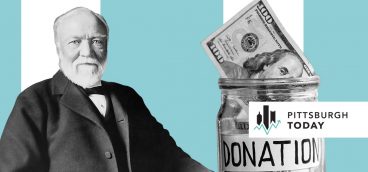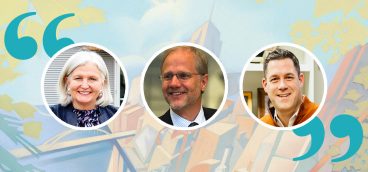Considering a Pittsburgh Tradition

It was two years ago that Bill Dietrich, our longtime Pittsburgh Quarterly history writer, died and left $500 million to community institutions. I mentioned Bill to out-of-towners recently while explaining Pittsburgh’s unusual social fabric. He’d studied Pittsburgh’s industrial titans and the legacies they left that still shape our city. If he’d grown up elsewhere, Bill might not have left his money to the public good. But he was a Pittsburgher, and philanthropy was the cultural pattern here.
So with a salute to Bill, it seems appropriate as the holidays approach to consider Pittsburgh’s storied philanthropic spirit, past and present. Andrew Carnegie famously got the ball rolling with his 1889 article, “The Gospel of Wealth.” He argued that, in an age of great new wealth and financial inequality, the fortunate have a responsibility to redistribute their surplus for public benefit.
Some 68 years later, in a codicil to his will, Michael Benedum, founder of the Claude Worthington Benedum Foundation, eloquently penned his own thoughts: “I have always felt that I have been only a trustee for such material wealth as Providence has placed in my hands. This trusteeship has weighed heavily upon me.
In carrying out this final responsibility of my stewardship, I have sought to utilize such wisdom and understanding of equity as the Creator has given me. No one with any regard for his responsibility to his God and his fellow man should do less. No one can do more… Only those who sustain the faltering ones on the rungs above and extend a helping hand to the less fortunate on the rungs below, can approach the end with the strength of sublime faith and confidence.”
It used to be that philanthropy was the realm of the “super rich.” And in that context, Pittsburgh has been extremely fortunate, having the most philanthropic assets per capita of any U.S. city until 2006, when Warren Buffett joined his philanthropy with Bill Gates’s and Seattle took the top spot.
Times are changing, however, and philanthropy is becoming more democratic—within the reach of many whose fortunes, while not historic, are large enough to help their neighbors. Cities now face the challenge of cultivating charitable giving among that far greater number of successful people whose largesse is decisive to a city’s future. And in this relatively new arena, Pittsburgh is well poised, thanks to two key institutions, whose leaders have reinvigorated their agencies with new purpose and vision.
The Pittsburgh Foundation, under Grant Oliphant, has become one of the nation’s most creative and successful community foundations. The Foundation’s October Day of Giving gets justified acclaim, connecting donors with regional nonprofits and significantly building the nonprofits’ fundraising acumen in the process.
Receiving less notice is the fact that, with as little as $10,000, citizens can open their own charitable fund at the Foundation and get help focusing their giving from the Foundation’s staff.
The United Way is best known for its workplace campaign—under way through the end of the year. Almost all of the United Way’s charitable giving is pledged in the final quarter of the year, and much of that is through payroll deductions at 750 local companies. Lesser known is its Tocqueville Society for donors who give more than $10,000 a year. “It really is an effective way for making sure dollars get to the community’s critical needs,” said Steelers President Art Rooney, who co-chairs the de Tocqueville campaign with Gateway Financial CEO David Malone.
Finally, another august civic body known historically for its “top-down” approach is championing a “bottoms up” grassroots campaign to help local communities. The Allegheny Conference on Community Development via Bill Schenck of TriState Capital Bank is spearheading a program that gives companies an 80 percent state tax credit for investing in building local communities—Wilkinsburg and McKees Rocks to date.
United Way President Bob Nelkin put all the efforts in perspective and issued an implicit challenge at the same time. “I think we should work toward the goal of being the most generous city. That should be an ambition of ours. It should be our calling card.”
We agree. It’s a great idea for the new year in Pittsburgh.




